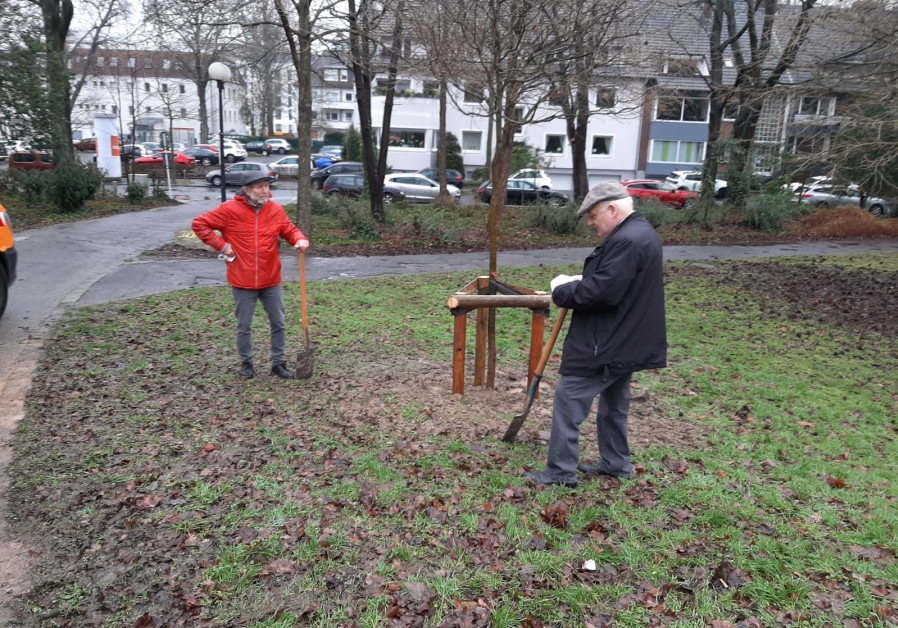In two European cities, Kiev and Dortmund, trees were planted in the center of town on Thursday. They were planted in a nod to Tu Bishvat, but also in the shadow of International Holocaust Remembrance Day, which was commemorated worldwide yesterday, acknowledging and respecting the tragic Jewish past in Europe, with eyes to a brighter future. On Tu Bishvat in 2020, last year, trees were planted in a park in the center of Kiev. The project was completed a year later, and on Tu Bishvat 2021 the Israeli embassy in Kiev officially dedicated the park, aptly naming it for the friendly relations between Israel and the Ukraine. In the west-German city of Dortmund, six trees, symbolizing the six million Jews who perished in the Holocaust, were planted by the city’s mayor, Norbert Schilf, and head of the Jewish community, Tzvi Rappaport, on Thursday. Schilf expressed how happy he was to be there, and said “we are fighting against anyone who’s ever said that we don’t need to remember, that we can forget. We cannot, it is our duty.” “The entire Jewish community is so excited to plant trees here on Tu Bishvat,” said Rappaport. Dortmund’s Jewish community today numbers in the 3,000s. According to Rabbi Baruch Babaev, a community rabbi in Dortmund, that is around what the Jewish population was in Dortmund in 1938.  Dortmund’s mayor Norbert Schilf (R) and Tzvi Rappaport (L) planting the symbolic six trees, January 28, 2021. (Credit: WORLD BNEI AKIVA)
Dortmund’s mayor Norbert Schilf (R) and Tzvi Rappaport (L) planting the symbolic six trees, January 28, 2021. (Credit: WORLD BNEI AKIVA)
if(window.location.pathname.indexOf(“656089”) != -1){console.log(“hedva connatix”);document.getElementsByClassName(“divConnatix”)[0].style.display =”none”;}Back in April, a request to reopen a Jewish Day School in Dortmund was approved by the city’s council. The last time the school was opened, it remained so until 1942, when it was shuttered by the Nazis, who arrested and deported the last 70 students standing to the ghetto in Riga, Latvia. In August, a Cologne-based artist, Guenther Demnig, installed “stumbling stone” memorial brass blocks all over Europe. One of the memorials in Dortmund bears the names of Rosa and Abraham Hacker, a Polish couple who moved to Dortmund and successfully built their own brush-making factory. They perished in the Holocaust, leaving behind five children. There are over 80,000 “stolpersteine” in total. To mark the 30-year long diplomatic relationship, the Israeli embassy in Kiev donated eight benches and four chess tables, each one dedicated to an Israeli figure who was born in the Ukraine, accessible through a QR code that park-goers can scan to find out more about the person. “We cannot ignore the symbolism and deep meaning in the fact that only yesterday we marked the International Holocaust Remembrance Day, and today we mark Tu Bishvat, the holiday of trees, of roots, of life,” said Joel Leon, Israel’s Ambassador to the Ukraine.
— Joel Lion (@ambassadorlion) January 28, 2021
The figures on the benches and chess tables are important and staple people in Israel’s history, including author Shmuel Yosef (S.Y.) Agnon, previous prime minister Golda Meir, and poet Shaul Tchernichovsky.  The park in the center of Kiev marking 30 years of diplomatic relations between Israel and Kiev, January 28, 2021. (Credit: ISRAELI EMBASSY IN KIEV)Israel and Ukraine established bilateral diplomatic relations back in 1991. A historic free trade agreement between the two has been in effect since the beginning of 2021. When Prime Minister Benjamin Netanyahu visited Kiev in August 2019, that was the first time an Israeli prime minister had done so in two decades. In October of that year, Ukraine opened a “diplomatic misson” — in the form of a hi-tech and investment office — in Jerusalem, despite strong opposition from the European Union. “It was important for us to find the link between International Holocaust Remembrance Day, dedicated to all that was uprooted and destroyed, and Tu Bishvat, which represents firm establishment — rooting — and growth,” said the Bnei Akiva emissaries in Dortmund, Ariel and Leora Wilner. “One whole day after the International Holocaust Remembrance Day trees are being planted, in honor of the Jewish holiday Tu Bishvat, in the center of town and in Hebrew,” said Rappaport. “This is proof that am yisrael chai (the nation of Israel lives).”
The park in the center of Kiev marking 30 years of diplomatic relations between Israel and Kiev, January 28, 2021. (Credit: ISRAELI EMBASSY IN KIEV)Israel and Ukraine established bilateral diplomatic relations back in 1991. A historic free trade agreement between the two has been in effect since the beginning of 2021. When Prime Minister Benjamin Netanyahu visited Kiev in August 2019, that was the first time an Israeli prime minister had done so in two decades. In October of that year, Ukraine opened a “diplomatic misson” — in the form of a hi-tech and investment office — in Jerusalem, despite strong opposition from the European Union. “It was important for us to find the link between International Holocaust Remembrance Day, dedicated to all that was uprooted and destroyed, and Tu Bishvat, which represents firm establishment — rooting — and growth,” said the Bnei Akiva emissaries in Dortmund, Ariel and Leora Wilner. “One whole day after the International Holocaust Remembrance Day trees are being planted, in honor of the Jewish holiday Tu Bishvat, in the center of town and in Hebrew,” said Rappaport. “This is proof that am yisrael chai (the nation of Israel lives).”
Source
Related posts:
Views: 0
 RSS Feed
RSS Feed

















 January 29th, 2021
January 29th, 2021  Awake Goy
Awake Goy  Posted in
Posted in  Tags:
Tags: 
















